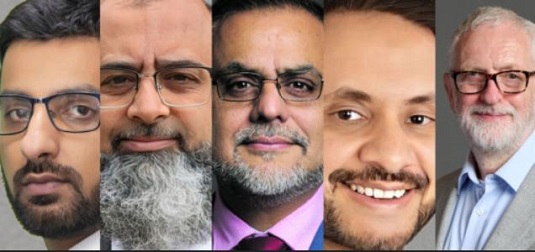
A couple of things in the gravy should get picked out before we reach the meat. First, that the political space to Labour's left is so obvious that even the bourgeois press are picking up on it. Patrick Maguire wrote about it for The Times last Thursday, and it got coverage from UnHerd, albeit through the prism of a whinge about religious sectarianism. Because the website's founder would never endorse divisive, extremist politics.
The second point, overlooked by professional politics watchers, is what's happening in the Commons. On 9th December, the Commons Procedure Committee announced an inquiry into the status of independent MPs. This is being explicitly convened to address the formation of the Independent Alliance, the grouping of Corbyn, Shockat Adam, Adnan Hussain, Ayoub Khan, and Iqbal Mohamed. This is to establish whether ad hoc groupings can be afforded the same rights as those sitting for registered political parties. It will also examine the "status" of independents, whether they're elected as such or end up losing a party whip. That the IA announced they were formalising themselves as a proper party the day after is sensible lest the committee finds ways of limiting their access to resources.
Considering the party itself, as noted on other occasions Corbyn isn't overly keen at the prospect of a new organisation, favouring a slow and steady community building approach. The issue with this is its strategic indifference to the political opportunities opening now to build something new. Such as the suspension of seven Labour MPs because they stood up for our people. The problems facing a new left party are well understood and have been covered here almost to death. There's the fractious character of the left and the legacies of bureaucratic manoeuvring and little Lenin syndrome, the Greens' left turn, and the outsized privilege any parliamentarian would enjoy in a new organisation. And this is an issue when you look at some of them criticising Labour's tax on landed wealth from the right, and opposition to banning on first cousin marriage. No party discipline works for the Greens because, among their four MPs, there's a great deal of policy agreement. Among an IA left party it's a recipe for internal dissension, chaos, and paralysis.
If these can be overcome, there is a big prize waiting. Of the Westminster parties, none speak to the reality of workers' lives in the 21st century. Labour doesn't, but its commitment to Blue Labourism seems like an excuse to do right wing things rather than a genuine and serious strategic orientation to the working class. The so-called Workers' Party of Britain seeks to fill the sweet spot identified by political scientists - economically radical but socially conservative. George Galloway has said that the "Arab world is dead to me" following the collapse of the Syrian regime, so that gives you an idea about the direction that project is heading. And then the Greens, economically radical and socially liberal - so the party enjoys congruence with most people's outlooks. But the absence of an explicit class orientation in words and deeds does and will continue cutting them off from the most disenfranchised voters - the people the left need to win and activate as a political force. The new alliance, if it gets the class orientation right, could supply Labour with more than a few migraines over this parliament. But, as ever, it depends on the politics and as they stand at the moment it would be wise to temper one's expectations.
Image Credit
I think the issue here is that it makes complete sense for the independent MP's to become a party for parliamentary purposes - it's how the tories and whigs were founded after all - but it's not going to be a coherent organisation. The appeal of independents is that they are independent, they are not going to want to be a formal thing, it's not why people voted for them. All this talk of a new left party seems premature, as you say; the people who want a new left party have no parliamentary representation, the people who have representation neither want or need one!
ReplyDeleteI used to think the work you carried out on the long term decline of the Tories meant that we would see them become a rumpand a Labour Party would become the natural party of government. However, it seems the beneficiaries will be a radical right party, Reform. It shows the flexibility in policy, the energy of zealots and looks likely to have the funding and a number of daily organs of its central committee in the 'Express' and 'Mail'.
ReplyDeleteThe new left grouping may cause Labour some concern but will likely go the way of the ILP, with a few personality MPs, before fading away.